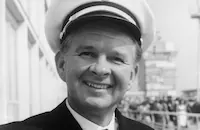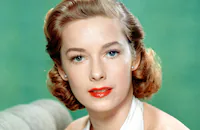For Men Only

Cast & Crew
Paul Henreid
Paul Henreid
Margaret Field
James Dobson
Douglas Kennedy
Robert Carson
Film Details
Technical Specs

Synopsis
As part of its initiation rites, the Wake College Omega Nu fraternity brothers, led by their president, Ky Walker, force gentle pledge Tod Palmer to swim in freezing-cold water until he nearly drowns. When Tod still shows no fear, Ky vows to break him. The next day, Tod is late for his blood pathology class, prompting his professor and mentor, Dr. Stephen Brice, to ask him if pledging has made his grades slip from As to Cs. Tod denies this, and after class, Ky beats him publicly with a paddle. Although Tod's girl friend Kathy Hughes insists that Ky has a vendetta against him and he must quit the fraternity, he demurs. Meanwhile, at Stephen's home, his wife Julie pressures him to push to be dean of the medical school so they can finally enjoy some prosperity and social standing. Just then, Tod's mother visits and asks Stephen if she should sign the fraternity's affidavit, which frees the students from responsibility for Tod during Hell Night that evening. Stephen encourages her to sign, knowing that it would shame Tod to be thrown out of Omega Nu and labeled a coward. As Hell Night begins, the four pledges, including Bartholomew "Beanie" Brown, are blindfolded and brought to the middle of the forest. There, dozens of alumni watch as the pledges' clothes are ripped and faces painted. Ky instructs Tod to shoot a puppy in the head, but after he refuses, Beanie kills the dog and Ky forces Tod to drink the blood. Tod knocks the cup down, and when Ky punches him, he flees into the forest, pursued by the fraternity members. Tod escapes to Stephen's, who helps him bring his story to district attorney Jesse Hopkins and school president Colin Mayberry. They pursue the case but, finding no clues and believing Beanie's lie that the dog killing was just a prank, drop it, to Mayberry's relief. Julie chastises Stephen for jeopardizing his career, and then the next day, Ky whips Wake into a fury over Tod's accusations. Tod explains to Kathy that he must stay in school to help the next year's pledges, but he is hazed all day and then, when he tries to pick up his clothes at the frat house, the brothers throw him out and pursue him in his car. Frightened, Tod veers off the road and hits another car. At the hospital, Mrs. Palmer blames Stephen for Tod's serious injuries, and when sultry student Tracy Norman suggests he use her father's estate to address the student body, a guilt-stricken Stephen ignores her flirting and agrees. The next day, Julie witnesses Tracy trying to seduce Stephen, and gives him an ultimatum: he must drop the speech or she will move out. Stephen is crushed but cannot call off his crusade, so Julie leaves tearfully. During Stephen's speech, Kathy delivers the news that Tod has died, and the students all sign the petition to abolish hazing. Tracy later tries to kiss Stephen, prompting him to tell her that she is beautiful but spoiled and must grow up. Furious, she runs outside, where Ky, her ex-boyfriend, convinces her to seek revenge. She promptly visits Stephen in his lab, kisses and claws him, and then screams that she has been attacked. With no proof from either side, the Board of Regents is forced to fire Stephen to avoid scandal. Outside, Julie is waiting, contrite. They prepare to move to his father's home in Wisconsin, but are interrupted by a call from Beanie. Ky has admitted to his brothers that Tracy lied, and Beanie now offers to tell this to the board. Ky hears him, however, and scares him into submission by beating him up. When Beanie does not show up at the board meeting, Stephen tracks him down and notices that the boy's swollen chin matches Ky's sore knuckles. That night, Stephen goes to Omega Nu and is told that Beanie has left school. He confronts Ky, taking his bandage to analyze whether it bears traces of Beanie's blood. Ky spies on Stephen at the lab and finally breaks in, dousing the lights. He hits Stephen but the professor intimidates him into admitting that he killed the dog and arranged the attack story with Tracy. Stephen calls out to Kathy, two professors and Mayberry, who have been listening behind the door. Mayberry apologizes to Stephen and begs him to stay on as dean to oversee the eradication of hazing. Stephen agrees, hoping that the incoming class will include another boy like Tod Palmer.

Director

Paul Henreid
Cast

Paul Henreid

Margaret Field

James Dobson

Douglas Kennedy

Robert Carson
Virginia Mullen
O. Z. Whitehead

Kathleen Hughes

Russell Johnson

Vera Miles
Robert Sherman
Steven Clark
Chris Drake
Bob Chapman
Arthur Marshall
Frank Mathias
Crew
Hoyt S. Curtin
Frank Durlauf
Irving Friedman
Frank Heath
Paul Henreid
Paul Ivano
Eugene Klum
Robert L. Lippert
Lisl
Herbert Margolis
Lou Morheim
Lou Morheim
Mory's Of Beverly Hills
Sherman Rose
Paul Schmitz Sr.
Clarence Steensen
Herman E. Webber
Frank Webster

Film Details
Technical Specs

Articles
For Men Only -
By the early 1950s, Henreid's career was in decline. He was blacklisted by Hollywood as a Communist sympathizer, which greatly limited his job opportunities and for several years he worked almost exclusively in Europe. Furthermore, Henreid, best known for his iconic performances in Casablanca and Now, Voyager (both 1942), had been typecast in good-guy roles. Wanting to take control of his career, he sought more responsibility behind the camera. He saw an opportunity with the Eagle-Lion film Hollow Triumph (1948). He took on the role of producer and cast himself as the villain, a role that would give him the creative challenge he desired. When director Steve Sekely clashed with Eagle-Lion, he was fired and replaced by Henreid who directed the remainder of the film. This was the catalyst for the next phase in Henreid's career. He went on to direct six feature films and many television episodes, including several for Alfred Hitchcock Presents.
For Men Only was financed by theater owner turned producer Robert L. Lippert. Henreid joined forces with producers William and Edward Nassour to form H-N Productions. While there were plans to make more films under this outfit, For Men Only would ultimately be their sole project. Henreid served as both producer and director on the film and according to J.D. Spiro of The New York Times, Henreid cast himself as one of the leads because "the cheapest way to get the name actor for the lead role would be to play it himself."
Actor Russell Johnson, Vera Miles, Robert Sherman and Kathleen Hughes all had their credited film debuts with For Men Only. Russell Johnson, who's eventual claim to fame would be the role of The Professor on Gilligan's Island, was cast as the lead villain Ky Walker. Broadway dancer Bambi Linn was cast in the film but had to drop out due to a work conflict and was replaced by Vera Miles in the role of Kathy. Margaret Field, mother of actress Sally Field, played opposite Henreid as the professor's wife. Kathleen Hughes, who had appeared in numerous uncredited bit parts for 20th Century-Fox, landed the juicy role of Tracy Norman, the socialite college student who tries to implicate Henreid's character, Dr. Brice, in a sexual harassment scandal. The following year, Hughes would appear in Universal's science fiction film It Came from Outer Space (1953). A promotional portrait of Hughes from that film, with arms raised and screaming, would soon make her an icon of cult cinema.
Several locations were scouted for filming including ones in San Diego, Colorado Springs, Denver and Reno. Ultimately, For Men Only was shot at General Service Studios (later renamed Hollywood Center Studios) as well as one of the earlier campus locations of the Los Angeles City College. Production ran through September 1951. Henreid's wife, who went by the name Lisl, served as costumer. Financier Lippert and Henreid carefully released vague bits of information about the production to news outlets. They were secretive about the film's subject matter except to say it was "topical and controversial." Henreid worried that another production company would pounce on the timely topic of hazing and release a picture before he could.
For Men Only was released January 11th, 1952. It garnered mixed reviews which skewed towards positive. The Hollywood Reporter called the film "an example of... enterprise and ingenuity." The New York Times called Henreid's film a "serious little item" and that it "seems to be jousting against a terribly tiny dragon." It went on to note that "Mr. Henreid's contribution is not a shattering castigation, nor is it likely to cause sweeping reform."
The title For Men Only inherently alienated a key demographic: women. Henreid originally wanted to call the film Hell-Night but later changed it to For Men Only to appease the censors. After the film's release, the marketing shifted in order to encourage women to see it. Taglines including "... and Women, Too!", "KISS by KISS.. It's today's most shocking scandal!" and "RIPPED!... from the heart of a woman's hate" called out the movie's sex scandal subplot. When Kathleen Hughes later rose to fame, the film was repackaged as The Tall Lie with Hughes' name and image featured more prominently on the poster and marketing materials.
by Raquel Stecher

For Men Only -
Quotes
Trivia
Notes
This film marked Paul Henreid's debut as a producer-director. Although most sources, including the onscreen credits, refer to the production company as H-N Productions, which was co-owned by Henreid and the Nassour Brothers, some pre-production sources use the name Paul Henreid/Nassour Brothers Productions. Although the onscreen credits claim For Men Only marked the debuts of Kathleen Hughes, Russell Johnson, Vera Miles and Robert Sherman, and Hollywood Reporter news item add Margaret Field to the list, only Johnson made his first feature film appearance in the picture. Other Hollywood Reporter news items add Bambi Lynn, Margie Wilson, Darr Smith and Louis Cutelli to the cast, but their appearance in the final film has not been confirmed. According to various Hollywood Reporter news items, locations were scouted in San Diego, Colorado Springs, Denver, Reno and the KTTV Studios in Los Angeles, but the film was eventually shot at the General Service Studios and Los Angeles City College.
The Hollywood Reporter review called the picture "an example of the enterprise and ingenuity that are needed in the field" of independent film. An April 1952 Hollywood Reporter article reported that the picture did mild business because women felt ignored by the title, forcing the distributors to pull the film and rename it Time for Men Only. According to a May 1953 Daily Variety item, the film had recently been renamed The Tall Lie and Kathleen Hughes's billing elevated to co-star status.














